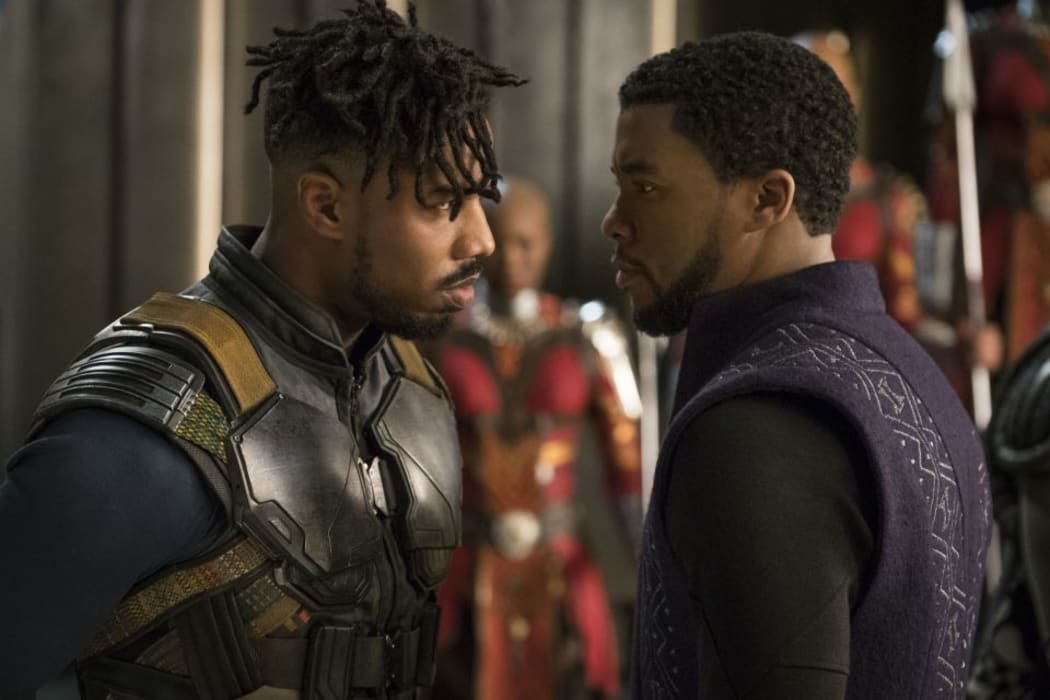Marvel's latest, writes Katie Parker, is more than a cinematic triumph: it's a game-changer.

Photo: Marvel
“Guns”, sighs General Okoye, the head of Black Panther’s all-female defence team, as she and Lupita Nyong'o’s Nakia battle enemy fire mid car-chase through the streets of South Korea. “So primitive.”
In a lesser film such a line - deadpanned brilliantly by actress Danai Gurira - would be little more than a throwaway piece of dialogue, a cheap joke to cut through the tension. In Black Panther, Ryan Coogler’s stunning adaptation of the Marvel comic, it is just one of many perfectly executed moments that carefully, thoughtfully accumulate to obliterate the colonialist, Eurocentric ideology that underlies the genre and industry from which it emerges.
Picking up where Captain America: Civil War - the film that introduced him - left off, Black Panther sees T’Challa (Chadwick Boseman) return to the fictional African Garden of Eden Wakanda, to assume his late father’s throne and the role of Black Panther.
This, we learn via a graphics sequence that is as economically efficient as it is exquisite, was centuries ago the landing place of a meteorite which brought with it the mysterious vibranium, a metal with which the land became infused. Finding that the substance bestows superhuman powers, the five tribes of the region decide to conceal the discovery, becoming the secret home of a society more harmonious and technologically advanced than anywhere else in a world which still considers Wakanda a third world country.
Of course, in protecting their secret paradise, Wakanda is faced with a predicament: if no one knows about their bountiful, extraordinary resources then no one else - not even the struggling African countries they call their neighbours - can benefit from them.
At first, this seems like little more than a philosophical point of contention between T’Challa and ex-girlfriend Nakia - one that falls to the wayside when black market arms dealer Ulysses Klaue (a pleasantly camp Andy Serkis) steals and attempts to sell an ancient Wakandan artefact containing vibranium. Yet, while undertaking a mission to retrieve the item, T'Challa, Okoye, and Nakia find that Wakanda’s isolationist policies may have in fact bred a threat more powerful and dangerous than they could have ever imagined.
Last year Wonder Woman felt like a beacon of hope merely by ushering in the most incremental changes in with an otherwise fairly conventional narrative. Black Panther, by comparison, is a flashing siren, blaring with uncompromised, unapologetic fury.
No one in the expansive cast is wasted: not the regal Angela Bassett as the Queen mother Ramonda, not the incandescent Letitia Wright as T’Challa’s sister and tech wiz Shuri, not even the incredible Sterling K. Brown whose scenes pack more emotional impact than their brevity should rightly allow.
That Black Panther can be at once totally thrilling and deeply moving is a testament to its deft handling of even the most fraught themes. The world of Wakanda is beautiful for its stunning scenery, but also for the way technology and indigenous tradition are married to confront Eurocentric ideology at its core. Okoye and the female warriors who surround T’Challa take their strength from more than just their advanced weaponry, and turn the battle scenes into far more than just ruminations on the mechanics of killing.
Even the dichotomy between good and bad here is too nuanced to truly call central antagonist Erik Killmonger (an absolutely electric Michael B. Jordan) a villain. Born of history and trauma beyond his control he is instead more of an extremely troubled combatant posing an almost impossible question: how can you dismantle the power structures of which you are a product? And to what extent are you complicit in the survival of those power structures by choosing to exist outside of them?
With an already record-breaking box office debut and 98% score on Rotten Tomatoes - the highest of any Marvel film - Black Panther is already an unprecedented and landmark moment for an industry where predominantly African American casts are basically unheard of outside of period pieces about black suffering. At a time when no one should be surprised that white supremacists have taken it upon themselves to try and sabotage the film’s online scores and discourse, the reception that Black Panther has received so far speaks volumes.
At just 31, Coogler is already a glaring anomaly in Hollywood: a young African American filmmaker telling stories of modern blackness without even momentarily compromising the humanity and complexity of his subjects.
Entirely devoid of any pandering to white audiences, Coogler’s work here is game-changing. Where Marvel movies are so often busy and showy with self-conscious and insubstantial detail, each of Black Panther’s many moving parts are integral and indispensable to a story that forms a political critique more complex and nuanced than the majority of ~serious~ dramas released this century.
With Get Out firmly in the Oscar race and films like the intensely problematic Three Billboards Outside of Ebbing, Missouri finally being discussed in the terms they deserve, the idea of Hollywood becoming a space in which to reckon with the world as we know it feels almost tantalisingly within reach.
As cynical as I feel about Marvel movies, and as hard as it is to believe in an industry run by sexist old white men, Black Panther still feels like more than a cinematic triumph: it’s a watershed moment and an almost unbelievably radical expression of resistance in the mainstream, right when the world needs it the most.

